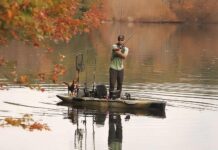After an apparent illegal release of largemouth bass on West Musquash Lake in Washington County, wardens are now offering monetary rewards totalling $6,000 to anyone with information regarding the illegal release that leads to the arrest and convictions of responsible parties.
Fisheries biologists confirmed the presence of largemouth bass in West Musquash Lake and expect that the bass will outcompete native species.
Maine lake likely to see permanent impacts on fishery after illegal bass release
“With complete eradication unlikely to be possible, this crime will sadly change the lake forever,” wrote the Maine Department of Inland Fisheries & Wildlife (IFW) on Facebook.
West Musquash Lake hosts a wild brook trout fishery as well as lake trout, landlocked salmon and round whitefish. It is not stocked by the IFW, and is the only body of water in the Downeast region with wild brook trout and one of the last places in Maine with a population of round whitefish.
The IFW went on to explain that biologists were able to confirm the absence of largemouth bass in Orie Lake which feeds into West Musquash Lake and natural upstream barriers prevent bass from reaching the lake. This led biologists to the conclusion that illegal largemouth bass were most likely introduced through human interference.
Due to the size and location of West Musquash, eradication of the bass from the lake is unlikely. IFW also said that they will encourage anglers who catch bass to harvest the fish.
The IFW confirmed there is already an established bass population on West Musquash Lake as a result of the suspected release and biologists will monitor native fisheries to determine if regulations or stocking programs need to change in response.
Invasive bass in New England
This is not the first time invasive bass in the region have led to controversy and monetary consequences. In 2025, Nova Scotia anglers saw new legislation implementing fines up to $500,000 and potential jail time for releasing smallmouth bass and chain pickerel.
In Maine, the first case of illegal stocking on record occurred on Belgrade Lake in the 1970s when northern pike were dumped according to the IFW. In the past eight years alone the IFW reports 75 cases of illegal introductions in Maine waters, with each case posing a threat to the ecosystems the fish were dumped in.
The IFW encourages anglers to always dispose of unused bait on land or in a trash can, follow fishing regulations, report instances of someone keeping fish alive, transporting fish or releasing a fish they didn’t catch, and to remember that if you catch a fish that you believe isn’t native to take a picture and not to release that fish.
Anyone with information is asked to contact the Maine Warden Service or to leave a tip with the Maine Operation Game Thief at 1-800-235-7887.
Feature Image: Maine Department of Inland Fisheries and Wildlife | Facebook







Are there other lakes or bodies of water close to the Lake? Seems like it would be hard to keep a fish alive for so long to transport for invading lake. Also would be tough to order bass for restocking! Might be reasonable to check current close proximity fish hatching sites for any transactions dealing with the Largemouth Bass.